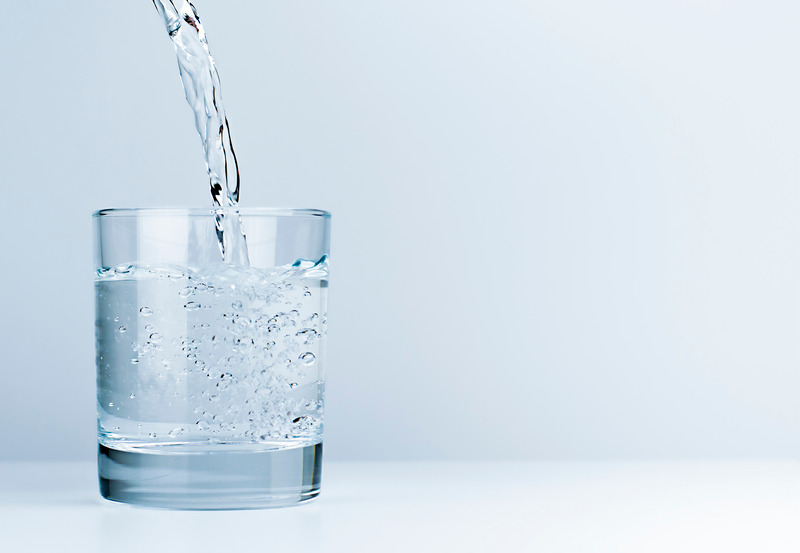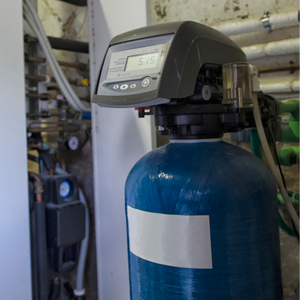
We all know that it is crucial for us to feel comfortable with the water coming out of our faucets in our sinks and bathtubs. Many of us in the Ohio region have hard water, which isn’t harmful but can affect your everyday life – making you feel dry, making things more challenging to clean, and leaving a film on appliances. There is a solution to treating the hard water coming into your home – a water softener.
A water softener is a device that treats hard water by removing minerals that cause hardness. A water softener helps to prevent scale buildup in plumbing and appliances, improves the effectiveness of soaps and detergents, and extends the lifespan of household systems that use water.
Water softeners remove hardness-causing minerals such as calcium, magnesium, iron, and manganese. While these minerals can affect your appliances and cleaning habits, they can also clog pipes, restricting water flow and shortening appliance lifespan. A water softener can remove these minerals, ensuring that your water is clean and healthy for your home.
Understanding Hard Water
Hard water contains a high concentration of minerals, primarily calcium and magnesium ions. These minerals are picked up as the water passes through deposits of limestone, chalk, or gypsum, and they get transferred into the water you use. Ways of knowing you have hard water are:
- Scale buildup – Deposits of calcium and magnesium form inside pipes, water heaters, and appliances, reducing the efficiency and lifespan. You may see a white film/buildup on the location where the water comes from.
- Soap scum – Soap can react with the calcium and magnesium ions which form soap scum on surfaces and skin. It can make cleaning difficult.
- Reduced lathering – Soaps and detergents are less effective in hard water because they don’t lather well.
- Stiff laundry – Clothes washed in hard water can feel stiff and look dull.
- Spots on dishes and glassware – Hard water can leave spots and a white, cloudy film on dishes and glassware.
- Dry skin and hair – Hard water can leave skin feeling dry and hair looking dry or dull.
As you can tell from the list above, hard water can affect everyday life. It makes bathrooms and sinks harder to clean, you may notice dull-looking clothes from washing, and dishes may look dirty even though they have been cleaned. Even cooking with hard water, while not harmful to health, can impact the quality of food and beverages.
What Does a Water Softener Remove?
A water softener primarily removes:
- Calcium – A significant contributor to water hardness and can cause scale buildup on pipes and appliances.
- Magnesium – Another major contributor to hard water and can lead to scale buildup.
Other contaminants that water softeners remove include:
- Iron – Low levels of iron can be removed from a water softener, but higher levels may require a more robust iron filter. Some signs of iron in your water could be rust-colored spots on laundry after washing, a metallic taste, and rusty/slimy buildup.
- Manganese – Can be removed in small amounts by a water softener. If you can see black particles/sediment in the water, notice discolored water or see black or brown stains on sinks, toilets, tubs, and laundry it might be a sign of manganese in your water.
Water Softener Process: How It Works
Water softeners use an intense process to remove minerals such as calcium and magnesium. The process starts with the ion exchange process:
- Hard water comes into a resin tank filled with resin beads that are coated with sodium or potassium ions. The water flows over the beads.
- As hard water passes through, calcium and magnesium ions are attracted to the resin beads and are exchanged for sodium or potassium ions. The water that exits the tank is now softened.
After completing the ion exchange process, there is a regeneration cycle:
- Over time, the resin beads become saturated with calcium and magnesium ions. The softener has a separate tank filled with salt.
- The system reverses the flow of water to flush out debris in the resin tank.
- A brine solution in the resin tank displaces calcium and magnesium ions with sodium ions.
- The displaced minerals are then flushed from the tank, and the resin beads are recharged.
Benefits of Removing Contaminants From Your Home’s Water
Installing a water softener will definitely provide you with many benefits throughout your home. Your hair and skin will feel better, your appliances and dishes will look cleaner, and you may also notice that things are easier to clean.
Here are some more benefits you’ll notice when using a water softener:
- Prevents scale buildup – protects pipes and appliances from mineral deposits.
- Improves cleaning – enhances the effectiveness of soaps and detergents, reducing soap scum and residue.
- Extends appliance lifespan – reduces wear and tear on appliances that use water, like water heaters. You don’t have to worry about the buildup that can cause these appliances to work harder.
- Softens skin and hair – you’ll notice that your skin and hair feel softer and look less dull because mineral deposits are reduced.
Limitations of Water Softeners
Water softeners are effective in removing minerals causing hardness in water, but water softeners also have limitations:
- Water softeners don’t remove all contaminants – A water softener will not remove high concentrations of iron and manganese, sulfur, sediment, bacteria, viruses, or chemicals like pesticides.
- Maintenance and salt use – Regular maintenance is required, and you will have to fill the brine tank with salt on about a monthly basis.
- Space requirements – You will want to ensure your home has enough space for both the resin tank and brine tank.
- Not effective for all water issues – Water softeners are specifically designed to remove hardness in water. Water with high levels of iron, sulfur, or other specific contaminants will not be treated effectively with a water softener.
However, if you feel your water softener isn’t working as effectively as it should, there are alternatives and supplemental water treatment systems you can use in addition to water softeners.
These include:
- Whole House Filtration Systems – These systems can remove a broader range of contaminants.
- Reverse Osmosis Systems – Effective at removing a broad spectrum of contaminants and providing high-quality drinking water.
- Salt-Free Water Conditioners – These systems prevent scale buildup without adding sodium or potassium to the water.
- Point of Use Filters – Installed at specific locations to address particular contaminants and improve water quality for drinking and cooking.
Need Water Softening Services? Call Logan Today!
Water softeners provide many benefits for the water supply in your home. They are designed to eliminate certain minerals to remove hardness in the water. The main contaminants that a water softener removes are calcium and magnesium. When a water softener is installed, you’ll notice less scale buildup, help improve skin and hair, extend appliance lifespan, and improve cleaning throughout your home.
Don’t know if you have hard water in your home? Call the Logan Services team to conduct a water hardness test. Our experts will perform a FREE chemical test to let you know what we see in your water. We can then sit down with you and review the best water treatment options for your home, including water softener services. Logan Services is ready to handle all your plumbing needs! Request your free plumbing estimate now!





















